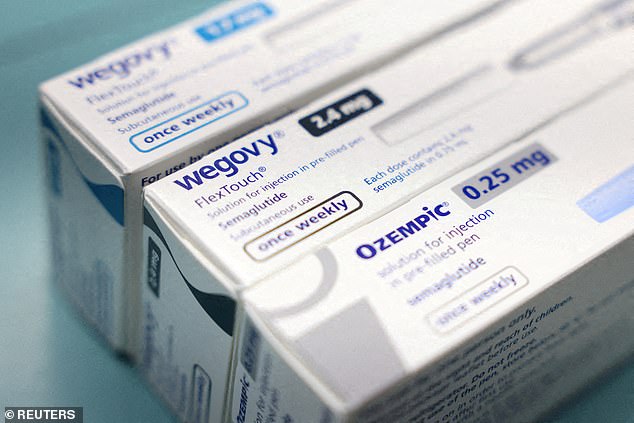England’s stark Ozempic divide was today laid bare in a revealing map that shows how prescriptions for the slimming jabs are 7-times higher in some areas than others.
Leicester is the weight loss injection capital with almost 2,000 drugs prescribed each month, 6.8 times the proportion dished out in Kernow, Cornwall.
Second is Thurrock in Essex, where weight loss jabs accounted for five times more prescriptions than in Sheffield and south west London.
It comes as a fresh research today suggested that more than one in 10 women were now taking slimming jabs in the UK.
Separate NHS data shows a total of 1.45million semaglutide prescriptions were dolled out in 2023/24, with just under 139,000 in October 2024 — the latest figure available.
This does not include the numerous patients who are accessing the drug privately, paying roughly £200 per month.
Doctors have long told how they are treating increasing numbers of slim women who end up in hospital after falsely telling online chemists they are overweight to pass eligibility checks.
Senior medics have even warned that A&E units are treating casualties of the appetite-suppressing drugs on a daily basis.

Semaglutide, the powerful ingredient behind Ozempic and Wegovy, spurs weight loss by mimicking the actions of a hormone released in the gut after eating, called GLP-1
Under NHS guidelines, only patients who have a body mass index (BMI) of over 35, or a BMI of 30 and at least one weight related health problem like high blood pressure, should be prescribed Wegovy.
UK law forbids the sale of such drugs without a prescription from a medical professional.
Semaglutide, sold under the brand names Ozempic and Wegovy, is the powerful ingredient behind the jabs’ weight loss effects.
Wegovy has been available on the NHS for weight loss since 2023. But Ozempic is still only prescribed to treat type 2 diabetes.
NHS Leicester City is the Trust with the highest number of weight loss jab prescriptions issued, as a proportion of total prescriptions.
Some 1,807 scripts were issued by healthcare professionals there in October 2024, accounting for 2.6 per 1,000 prescriptions — roughly one in every 400.
This was followed by NHS Thurrock in Essex and NHS Wirral with 698 and 1,792 accounting for 2.38 and 2.28 per 1,000 respectively in October 2024.
NHS Bury in Greater Manchester and NHS North Central London, which covers Barnet, Camden, Enfield, Haringey and Islington, also recorded 883 and 4,868 prescriptions.
This represented 2.27 and 2.21 prescriptions per 1,000 issued in that month.
By comparison, NHS Kernow in Cornwall issued 526 semaglutide prescriptions, accounting for 0.38 items per 1,000 prescribed — roughly one in every 2,500.
In Sheffield, the figure stood at 603 or 0.45 per 1,000. This is around one in every 2,200.
Separate freedom of information request data released by the NHS Business Services Authority last year also found over 120,000 patients were prescribed Ozempic in England in 2023. Just 68 were issued Wegovy — the type that’s licensed for weight loss in very obese people without associated health problems.
This is a drop of 10,000 on the 130,000-plus patients prescribed Ozempic in 2022.
Novo Nordisk’s semaglutide — also branded as Rybelsus — tricks the brain into thinking it’s full, consequently slashing appetite and stopping users from overeating.
Some patients are being asked to wait for up to five years for specialist weight management support, according to the Obesity Health Alliance.
In parts of the country, some overstretched services have closed their waiting lists entirely.

In September, 26-year-old Lottie Moss revealed she was rushed to hospital after suffering an Ozempic overdose using too high a dosage

Health officials have already seized more than 600 potentially fake Ozempic pens across the UK since the start of 2023
It comes as a fresh survey today revealed 11 per cent of women aged 30 to 75 in the UK were taking a weight loss jab.
According to Juniper, a digital weight-loss service which carried out the research, three quarters of the 1,000 women quizzed would consider taking the slimming injections in 2025 to lose weight.
Just 3 per cent admitted to ruling them out altogether.
There have been growing concerns about the number of healthy weight and underweight patients taking them for cosmetic reasons.
In September, 26-year-old Lottie Moss revealed she was rushed to hospital after suffering an Ozempic overdose using too high a dosage.
The model, who is the half sister of Kate Moss, was violently ill, had a seizure and was severely dehydrated taking the drug when she weighed around 60kg — just 9 stone.
She was given the jab by a friend who bought it under the counter from a doctor, she claimed.
In December, the nation’s top GP also warned that long waits for NHS weight-loss services are driving patients into buying potentially dangerous fake jabs online.
Professor Kamila Hawthorne, chairman of the Royal College of GPs, said she had ‘serious concerns’ about drugs sold by unregulated retailers.
Earlier this month, Britain’s drugs watchdog the Medicines Healthcare products Regulatory Agency (MHRA) also revealed it took down 150 social media posts ‘actively’ selling counterfeit weight loss drugs in 2024.
It came just weeks after the Advertising Standards Authority (ASA) issued a warning to advertisers, businesses and influencers to remove online and social media ads for weight-loss prescription-only medicines targeted at members of the public.
This followed a MailOnline investigation that found social media influencers were being encouraged to illegally promote prescription weight loss jabs to their thousands of followers.
This article was originally published by a www.dailymail.co.uk . Read the Original article here. .


